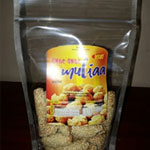Penerapan 5S (Seiri, Seiso, Seiton, Sheiketsu, Shitsuke) pada UKM Olahan Makanan di Dusun Sempu, Desa Wonokerto
DOI:
https://doi.org/10.14421/jbs.1260Keywords:
UKM, olahan makanan, Seiri Seiso Seiton Sheiketsu Shitsuke (5S)Abstract
Desa Wonokerto berada di kaki /lereng gunung merapi yang terletak di Kecamatan Turi Kabupaten Sleman Daerah Istimewa Yogyakarta. Secara geografis, Desa Wonokerto terletak pada ketinggian 400 s/d 900 m dari permukaan air laut. Dengan ketinggian tersebut, sebagian besar wilayahnya adalah pertanian. Salak terutama salak pondoh merupakan salah satu produk pertanian unggulan yang dimiliki oleh desa wonokerto. Metode dalam pengabdian masyarakat ini terdapat tiga tahap yakni: pra pelaksanaan (pemetaan masalah, rekomendasi pendampingan/pelatihan yang diberikan dan koordinasi dengan pihak desa dan UKM tersebut), pelaksanaan (FGD dengan perangkat desa dan ukm untuk mengetahui dengan detail permasalahan dari tiap jenis UKM yang ada, pelatihan dan penjelasan mengenai konsep 5S (Seiri, Seiso, Seiton, Sheiketsu, Shitsuke), implemetasi pelaksanaan 5S dan pasca pelaksanaan (monitoring). Output pada pengabdian masyarakat ini adalah: adanya implementasi 5S dalam proses produksi melalui penetaan ulang area produksi, adanya logistic book untuk setiap material yang digunakanWonokerto.
[Wonokerto Village is located at an altitude of 400 s/d 900 m above sea level. With these altitudes, most of the area is farming. Salak especially salak pondoh is one of the leading agricultural products owned by the village wonokerto. Methods of community service are three stages: pre-implementation (problem mapping, recommendations of mentoring/training provided and coordination with village and SMEs), implementation (FGDs with government and SME) to find out details of the problems of each type of SME, training and explanation of 5S (Seiri, Seiso, Seiton, Sheiketsu, Shitsuke) related rules, Implementation of 5S and post-implementation (monitoring).Outputs on community service are: Implementation of 5S with relayout the production area, logistic book for every production material.]
References
Farihah, Tutik, Krisdiyanto, Didik, Asmara, Sandra Praharani, 2017, Pendampingan Usaha Kecil Menengah di Desa Wonokerto Turi Melalui Program Pendampingan Sertifikasi Pangan Industri Rumah Tangga (PIRT), Proceeding Seminar Nasional 7: Menuju Masyarakat Madani dan Lestari, UII, Yogyakarta
Marwasta, Djaka, Pendampingan Masyarakat Desa Parangtritis dalam Pengelolaan Kawasan Gumuk Pasir melalui Kegiatan Diversifikasi Usaha Berbasis Sumber Daya Pesisir, International Journal of Community Engagement, Vol.2 No.2 Tahun 2017.
Purnomo, H, 2000, Budidaya Salak Pondoh, Aneka Ilmu Semarang.

Downloads
Published
Issue
Section
License
Authors who publish with this journal agree to the following terms:
- Authors retain copyright and grant the journal right of first publication with the work simultaneously licensed under a Creative Commons Attribution-NonCommercial-ShareAlike 4.0 International (CC BY-NC-SA 4.0) that allows others to share the work with an acknowledgement of the work's authorship and initial publication in this journal.
- Authors are able to enter into separate, additional contractual arrangements for the non-exclusive distribution of the journal's published version of the work (e.g., post it to an institutional repository or publish it in a book), with an acknowledgement of its initial publication in this journal.
- Authors are permitted and encouraged to post their work online (e.g., in institutional repositories or on their website) prior to and during the submission process, as it can lead to productive exchanges, as well as earlier and greater citation of published work.





